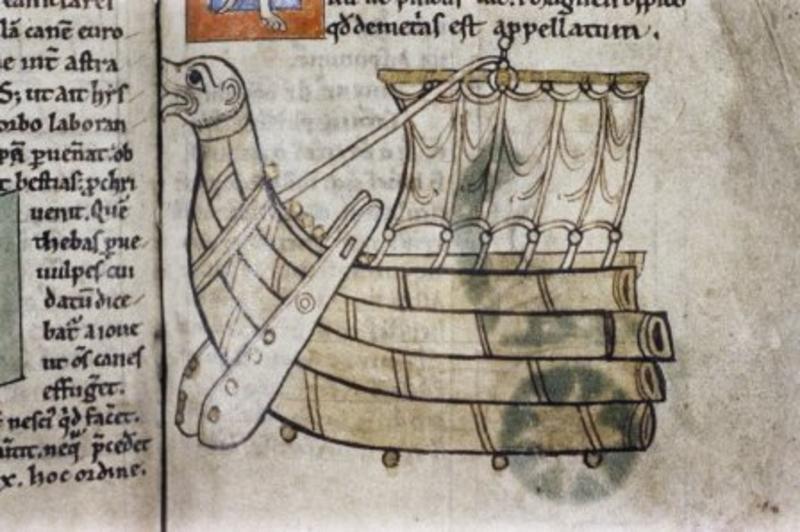Old Norse
Oxford is a world-leading centre of Old Norse-Icelandic studies; Old Norse is routinely taught as part of the BA in English Language and Literature, and at both MSt and DPhil level.
Graduate students interested in Old Norse-Icelandic language and literature will find themselves at the centre of a large and vibrant research community, with a strong international profile. We have two permanent faculty members whose main research area is Old Norse-Icelandic studies:
- Professor Siân Grønlie works on medieval conversion narratives, saints’ lives, biblical interpretation, saga literature and storytelling. Her books include The Old Testament in Medieval Icelandic Texts: Translation, Exegesis, and Storytelling (2024), The Medieval North and its Afterlife (2023), and The Saint and the Saga Hero: Hagiography and Early Icelandic Literature (2017). She is accepting new doctoral students.
- Professor Gareth Lloyd Evans works on questions of gender, sexuality, and emotion, and of identity more broadly, in Old Norse-Icelandic literature. He is also interested in ideas of poetics and style, particularly in relation to skaldic verse. He is author Men and Masculinities in the Sagas of Icelanders (2019) and co-editor of Masculinities in Old Norse Literature (2020). He is currently working on two book projects: The Poetics of Emotion in Saga Narrative and Karlkona: Trans Lives of the Viking World. He is also one of the editors of the journal Saga-Book. He is accepting new doctoral students.
We are also fortunate to have two professors emeriti who remain actively involved in the Oxford Old Norse community:
- Heather O’Donoghue, Professor Emeritus of Old Norse, has published widely on Old Norse literature. Her books include: Narrative in the Icelandic Family Saga: Meanings of Time in Old Norse Literature (2020), English Poetry and Old Norse Myth: A History (2014), From Asgard to Valhalla: The Remarkable History of the Old Norse Myths (2008), Old Norse-Icelandic Literature: A Short Introduction (2008), Skaldic Verse and the Poetics of Saga Narrative (2005), and The Genesis of a Saga Narrative (1991). Heather remains actively involved in Oxford’s Old Norse community but is not accepting new doctoral students.
- Carolyne Larrington, Emeritus Research Fellow at St John’s College, is interested in Old Norse literature, Arthurian literature, the treatment of emotion in medieval European literature and in the ways in which women are imagined across the literatures of the period. Most recently she has been working in medievalism, the re-mediation of medieval material in the modern period and on medieval emotion. Her most recent books are Approaches to Emotion in Middle English Literature (2024), The Norse Myths that Shape the Way We Think (2023), A Critical Companion to Old Norse Literary Genre (2020) and All Men Must Die: Power and Passion in Game of Thrones (2021). Carolyne remains actively involved in Oxford’s Old Norse community but is not accepting new doctoral students.
Taught postgraduates (MSt and MPhil): There is always at least one Old Norse option amongst the ‘C course’ choices for the 650–1550 MSt, up to three Old Norse options in the second year of the Medieval English MPhil, and we are happy to supervise master’s dissertations on almost any Old Norse or Old Norse / comparative literary topic.
Master’s students who are completely new to Old Norse can attend introductory classes throughout the first (Michaelmas) term of their course, in preparation for the following term’s option course.
Research postgraduates: We are happy to supervise DPhil research on almost any Old Norse or Old Norse / comparative literary topic. There is no requirement to consult a prospective supervisor before submitting an application for DPhil study, but you are welcome to do so if you so wish.
We have a termly seminar (ONORS – the Old Norse in Oxford Research Seminar) which welcomes distinguished visiting speakers from all over the world, as well as providing a friendly and supportive forum for graduates to present their work. The seminar is also a social occasion, and is followed by drinks and, usually, dinner. We welcome anyone – from undergraduates just starting out in Old Norse to interested graduates and senior members from other faculties – to the seminars (and to parties when there’s something to celebrate!) and our mailing list has around seventy names on it. We have close contact with specialists in other faculties such as history and archaeology so that co-supervision, or just informal advice gathering, is on hand when needed.
Oxford Old Norse scholars also have close collaborative links with Old Norse departments elsewhere in the UK, for instance, an annual symposium on Old Norse and Old English organized jointly by Oxford, Cambridge and London. We also regularly collaborate with scholars elsewhere in Europe and North America, both when they visit Oxford and when Oxford scholars and research students attend international workshops and conferences. Most recently, we have developed a student-focussed collaboration with Humboldt University in Berlin as part of the Oxford-Berlin research funding exchange.
As well as the celebrated resources of the Bodleian Libraries in Oxford we have access, through the English Faculty Library, the Turville-Petre Collection, which is one of the best collections of Old Norse books in the world. Both for its material resources – books and working space, especially – and for the sheer number of people working on Old Norse in one way or another who are always delighted to welcome newcomers, Oxford is an ideal place to begin or continue Old Norse studies at master’s level, and to pursue successful doctoral study.




